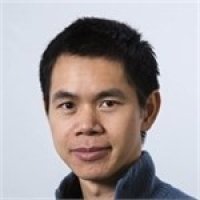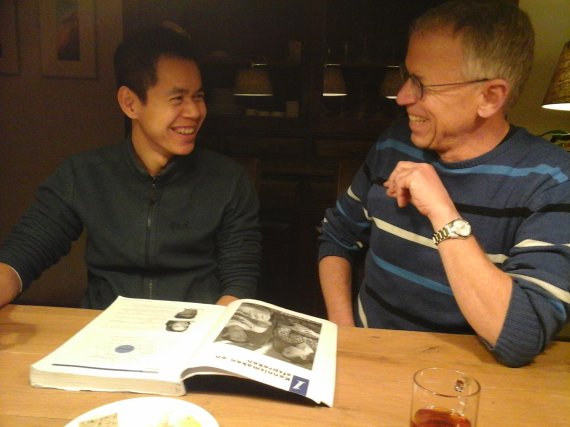Tien Nguyen and his language buddy Herman Thunnissen. © SamenSpraak
Systems and Synthetic Biology researcher Robert Smith has been living in Wageningen for almost five years. He learned the basics of Dutch (reading, writing and simple conversations) through the Social Dutch courses offered by Wageningen in’to Languages. ‘These courses form a sound base’, says Smith, who is English, ‘but I needed more to be able to have a real conversation.’ In order to improve his speaking, Smith decided to participate in SamenSpraak. ‘I think it’s important to speak Dutch properly. Self-confidence increases with the practice of speech.’
WUR professors Ton van Diest and Jan van den Ban founded SamenSpraak in 2000. ‘But one could say it had always existed here in Wageningen’, says SamenSpraak coordinator Bert van Dorsten. ‘Students from developing countries came here to study, but all lectures were in Dutch. So teachers would tell those students: “Okay, this is not getting us anywhere. Come over to my place, and I will teach you Dutch.” Cosy at your teacher’s home.’ SamenSpraak is housed at Gilde Wageningen, an organisation run by volunteers who want to share their knowledge and expertise with society – free of charge.

Learning the language has made me much happier. People appreciate it.
Robert Smith, researcher at Systems and Synthetic Biology
Smith was paired with Herman Thunnissen. During his career, Thunnissen worked at Alterra, among others. In the last ten years of his career, he taught in secondary schools. He has retired since. For the past three years, Thunnissen has been helping people speak Dutch through SamenSpraak. ‘It’s a great way to contribute: you meet all kinds of nice people, and it’s well organised.’
Each year, Thunnissen is paired with someone who wants to improve their Dutch. This year, it is Vietnamese RIKILT researcher Tien Nguyen, who came to Wageningen with his family three years ago. Nguyen is happy he has someone to practice Dutch with. He answers the questions in English, as his Dutch is not yet sufficiently advanced for a full interview. ‘Everyone speaks English here, that makes it more difficult to learn Dutch. You have to get to know people that are willing to speak Dutch with you. We practice at Herman’s house every week for one hour.’
How does such a practice session go?
‘That depends on the person’, Thunnissen explains. ‘Tien tends to formulate long and complicated sentences. That makes it very difficult. That is why we are now trying to have him make short and simple sentences.’ With Smith, the focus during the first two months was on grammar and stress. Smith: ‘We then started practicing with understanding faster spoken Dutch, by watching the news, for example. And to speak faster as well.’

Everyone speaks English here, that makes it more difficult to learn Dutch. You have to get to know people that are willing to speak Dutch with you.
Tien Nguyen, onderzoeker bij RIKILT
Thunnissen focuses on six or seven words every week. ‘Words used in daily life. So not words like gumball, but rather such words as glass, water, chair, bike, rain, and so on. The idea is that if you repeat those words seven times in different contexts, they will remember those words.’ It is up to Thunnissen’s language buddies to indicate what they want to talk about. ‘That’s also different for each person. With Tien, for example, I am currently talking about work and family, while at the same time I spoke to Robert about a part of the historical canon of the Netherlands. The subject itself is not very important. The most important thing about SamenSpraak is the talking itself. The subject doesn’t matter, as long as just talk.’
Friendships
The people who want to learn Dutch and their language buddies get to know each other well. Friendships arise. SamenSpraak coordinator Bert van Dorsten gives an example of a Japanese student. ‘He studied here and learned Dutch with us. Once he graduated, he returned home and invited his language buddy to Japan for a vacation. These are great experiences, obviously.’
Smith recommends everyone staying in the Netherlands for a while to learn the language. ‘Learning the language has made me much happier. People appreciate it.’
| Figures of SamenSpraak | – Each year, about 35 people request a language buddy to practice Dutch with. |
|---|---|
| – The majority of these are PhD candidates (about 25 per year). | |
| – Refugees (5 to 6 per year) and knowledge workers from abroad (4 to 5 per year) also apply. |
Are you interested in becoming or finding a language buddy through SamenSpraak? Visit the website or send an email to coordinator Bert van Dorsten (ehd@xs4all.nl).

